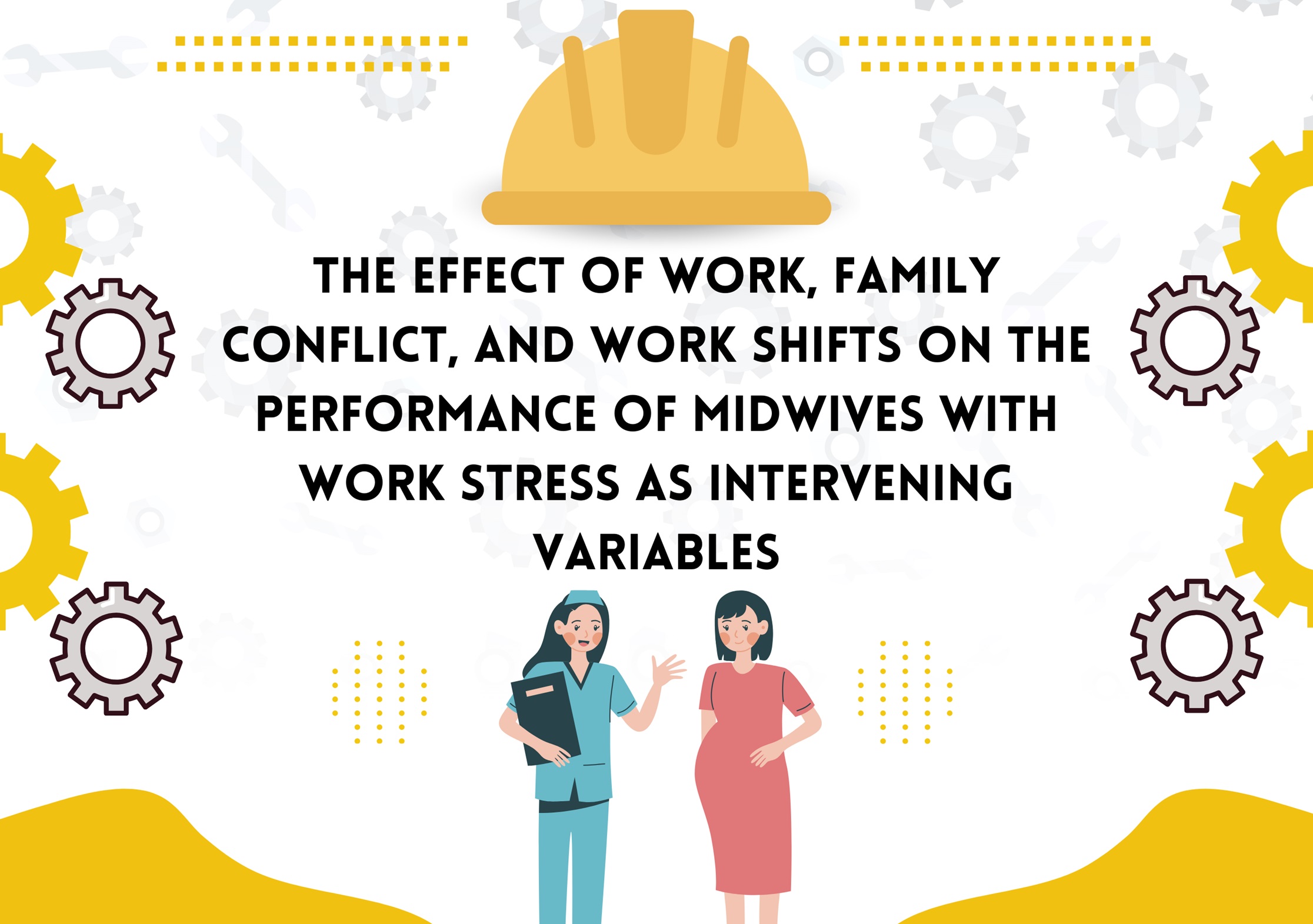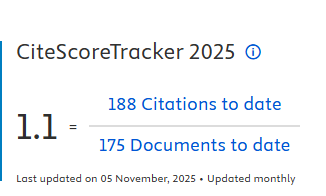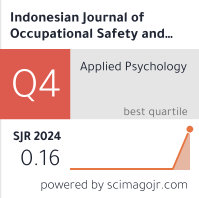The Effect of Work, Family Conflict, and Work Shifts on the Performance of Midwives with Work Stress as Intervening Variables

Downloads
Introduction: In hospitals, the most dominant human resources are health workers, especially female midwives who are married and have children. Midwives with these two roles will sometimes experience negative effects, commonly known as work-family conflicts. The purpose of the study was to ascertain the impact of work-family conflict, shift work, and work stress as intervening variables on midwives' performance in Class D General Hospital Pratama Pangkep. Method: The method used is quantitative analysis through a cross-sectional approach. A total of 53 people was the population while a sample of 38 female midwives was taken according to the inclusion criteria. Data collection was carried out using a questionnaire, while data analysis was carried out using path analysis. Result: According to the study's findings, work stress and performance were correlated (p = 0.000), as were work-family conflict and stress at work (p = 0.000), shift work and stress at work (p = 0.000), work-family conflict and performance through work stress (p = 0.004), and shift work and stress at work (p = 0.001). Conclusion: Based on the results of the path analysis conducted, it was found that there is a direct effect between work stress on performance, there is a direct effect between work-family conflict and work shifts on work stress.
Abubakar, F.L.P., Wariki, W.M.V. and Nelwan, J.E. (2023) ‘Hubungan Antara Konflik Peran Ganda dan Lingkungan Kerja dengan Kinerja Tenaga Kesehatan Wanita di RSUD Prof. Dr. H. Aloei Saboe', Jurnal Kesehatan Tambusai, 4(2), pp. 2103–2111.
Aptiani, S., Rinda, R.T.K. and Eldine, A. (2020) ‘Evaluasi Kinerja Karyawan Melalui Shift Kerja dan Lingkungan Kerja pada PT. Prakarsa Tiga Wiratama', Prosiding LPPM UIKA Bogor [Preprint].
Arini, B.P. (2021) ‘Pengaruh Shift Kerja dan Beban Kerja Terhadap Kinerja Perawat Pada Moslem Baby Day Care di Timoho Yogyakarta (Studi Pada Moslem Baby Day Care)', Akmenika: Jurnal Akuntansi dan Manajemen, 18(1), pp. 485–491.
Cahayu, S. (2019) Hubungan Shift Kerja Dengan Stres Kerja Pada Perawat Di Ruang Rawat Inap Di Rumah Sakit Umum Daerah Dr. Pirngadi Medan. Undergraduate Thesis. Medan: Facultyof Public Health Universitas Islam Negeri Sumatera Utara.
Choir, C.Y.M. (2022) Hubungan Work-Family Conflict dengan Kinerja Karyawan yang Sudah Menikah di PT Bunga Wangsa Sejati Jawa Timur Park 1. Undergraduate Thesis. Malang: Faculty of Psycology Universitas Islam Negeri Maulana Malik Ibrahim.
Farisi, S. and Utari, R.U. (2020) ‘Pengaruh Stres Kerja dan Lingkungan Kerja terhadap Kinerja Pegawai Dinas Kesehatan Provinsi Sumatera Utara', Jurnal Salman (Sosial Dan Manajemen), 1(2), pp. 31–42.
Ghislieri, C. et al. (2017) ‘Work–Family Conflict and Enrichment in Nurses: Between Job Demands, Perceived Organisational Support and Work–Family Backlash', Journal of Nursing Management, 25(1), pp. 65–75.
Hidayati, N., Zarlis, M. and Absah, Y. (2019) ‘Effect of Work-Family Conflict on Commitment Organization Through Work Stress with Religiosityas a Moderating Variable in Health Workers of Latersia Binjai Hospital', International Journal of Research and Review, 6(5), pp. 167–186.
Insan, M.Y. (2019) ‘Pengaruh Konflik Kerja Keluarga dan Motivasi Kerja terhadap Stres Kerja pada Perawat Rumah Sakit Wulan Windy Medan', Jurnal Bisnis Dan Kajian Strategi Manajemen, 3(2), pp. 119-131.
Janah, F.E. et al. (2017) Hubungan Shift Kerja Perawat dengan Stres Kerja di Instalasi Rawat Inap pada RS. Kanker Dharmais Tahun 2017. Undergraduate Thesis. Jakarta: Faculty of Health Sciences Universitas Esa Unggul.
Juwita, K. and Arintika, D. (2018) ‘Dampak Konflik Peran terhadap Stres dan Kepuasan Kerja Karyawan PT. Jombang Intermedia Press (Jawa Pos Radar Jombang)', Jurnal Manajemen Indonesia, 18(2), pp. 105–115.
Kaamilia'Aini, Z. and Paskarini, I. (2022) ‘Hubungan Beban Kerja Fisik dan Shift Kerja dengan Kelelahan Kerja Subjektif Pekerja Shift (Studi Pada Pekerja Shift di Puskesmas Kepohbaru, Kab. Bojonegoro)', Preventif: Jurnal Kesehatan Masyarakat, 13(4), pp. 596–610.
Kirana, V.D.C. and Dwiyanti, E. (2017) ‘Hubungan Stres Kerja dengan Kelelahan pada Perawat dengan Metode Pengukuran DASS 21 dan IFRC', Jurnal Ilmiah Kesehatan Media Husada, 6(1), pp. 133–140.
Lantara, D. and Nusran, M. (2019) Dunia Industri: Perspektif Psikologi Tenaga Kerja. Makassar: Nas Media Pustaka.
Liftyawan, K.S., Hadi, F.S. and Agustina, T.S. (2020) ‘Pengaruh Konflik Pekerjaan-Keluarga Kelelahan Emosional dan Stres Kerja terhadap Kinerja', Jurnal Penelitian IPTEKS, 5(1), pp. 1–16.
Mangkunegara, A.P. (2017) Manajemen Sumber Daya Manusia Perusahaan. Bandung: PT. Remaja Rosdakarya.
Mattola, M.P. (2020) Pengaruh Shift Kerja terhadap Stres Kerja dengan Kelelahan Kerja pada Pekerja PT. PLN (Persero) Area Pare-Pare. Undergraduate Thesis. Makassar: Faculty of Public Health Universitas Hasanuddin.
Ministry of Health RI (2009) Peraturan Menteri Kesehatan Republik Indonesia Nomor: 659/Menkes/Per/Vlll/2009 tentang Rumah Sakit Indonesia Kelas Dunia.
Ministry of Health RI (2017) Info Datin: Situasi Tenaga Keperawatan Indonesia. Jakarta.
Ministry of Health RI (2018) Profil Kesehatan Indonesia 2017. Jakarta.
Ministry of Manpower RI (2003) Undang-Undang Republik Indonesia Nomor 13 tahun 2003 Tentang Ketenagakerjaan. Cipta Jaya.
Muttaqin, L.Z. (2016) Pengaruh Gaya Kepemimpinan Transformasional dan Pengembangan SDM terhadap Kinerja Perawat RSJ Grhasia Yogyakarta. Undergraduate Thesis. Yogyakarta: Faculty of Economic Universitas Negeri Yogyakarta.
Parlagutan, M.T. and Pratama, M.Y. (2017) ‘Hubungan Work Family Conflict dengan Stres Kerja pada Perawat Wanita di Rumah Sakit Putri Hijau Medan', Jurnal Riset Hesti Medan Akper Kesdam I/BB Medan, 1(1), pp. 10–15.
Prabandari, F., Sumarni, S. and Astuti, D.P. (2020) ‘Pengaruh Kepuasan Kerja dan Stress Kerja terhadap Kinerja Bidan dalam Masa Pandemik Covid-19', in Prosiding University Research Colloquium, pp. 28–36.
Putri, F. and Gulo, Y. (2021) ‘Pengaruh Shift Kerja, Stres Kerja dan Lingkungan Kerja terhadap Kinerja Karyawan pada Divisi Produksi PT X', Research Paper, pp. 1–14.
Rhamdani, I. and Wartono, M. (2019) ‘Hubungan antara Shift Kerja, Kelelahan Kerja dengan Stres Kerja pada Perawat', Jurnal Biomedika dan Kesehatan, 2(3), pp. 104–110.
Saputra, E.K. (2021) ‘Analisis Work-Life Balance pada Perawat Wanita Sudah Menikah (Studi Kasus Rumah Sakit Umum Daerah Raja Ahmad Tabib) Provinsi Kepulauan Riau', Manajerial dan Bisnis Tanjungpinang, 4(2), pp. 106–114.
Sari, R., Yusran, S. and Ardiansyah, R.T. (2017) ‘Faktor yang Berhubungan dengan Stres Kerja pada Perawat di Ruang Rawat Inap Rumah Sakit Jiwa Provinsi Sulawesi Tenggara Tahun 2016', JIMKESMAS: Jurnal Ilmiah Mahasiswa Kesehatan Masyarakat, 2(6), pp. 1–11.
Sari, R.W.P.M. (2016) Pengaruh Konflik Peran Ganda dan Stres Kerja terhadap Kinerja Polisi Wanita di Polresta Surakarta. Undergraduate Thesis. Surakarta: Universitas Muhammadiyah Surakarta.
Satrio, P. (2015) Pengaruh Shift Kerja dan Stres Kerja Terhadap Kinerja Pramuniaga di PT Circleka Indonesia Utama Cabang Yogyakarta. Undergraduate Thesis. Yogyakarta: Faculty of Economic Universitas Negeri Yogyakarta.
Sugiyono (2015) Metode Penelitian Kombinasi (Mixed Methods). Bandung: Alfabeta.
Suka, K. et al. (2023) ‘Shift Kerja dan Beban Kerja dengan Tingkat Stres Tenaga Kesehatan Post Pandemi COVID-19', Journal of Telenursing (JOTING), 5(1), pp. 218–226.
Tenggor, D., Pondaag, L. and Hamel, R.S. (2019) ‘Faktor-Faktor Yang Berhubungan Dengan Kelelahan Kerja Pada Perawat Di Ruang Rawat Inap Rumah Sakit Umum Gmim Pancaran Kasih Manado', Jurnal Keperawatan, 7(1), pp. 1–8.
Tsamarah, N. (2020) Faktor-Faktor yang Berhubungan Terhadap Stres Kerja pada Petugas Keamanan dan Kebersihan UIN Syarif Hidayatullah Jakarta Tahun 2020. Undergraduate Thesis. Jakarta: Universitas Islam Negeri Syarif Hidayatullah.
Tualeka, A.R. (2020) Metodologi Penelitian Kesehatan dan Keselamatan Kerja. Surabaya: Airlangga University Press.
Utomo, W.S. (2020) Hubungan Antara Work Family Conflict Dengan Stres Kerja Pada Karyawan Wanita Rumah Sakit Ibu dan Anak X Pekanbaru. Thesis. Riau: Universitas Islam Riau.
Widyastuti, A.D. (2017) ‘Hubungan Stres Kerja dengan Kelelahan Kerja pada Pekerja Area Workshop Konstruksi Box Truck', The Indonesian Journal of Occupational Safety and Health, 6(2), pp. 216–224.

This work is licensed under a Creative Commons Attribution-NonCommercial-ShareAlike 4.0 International License.

In order to be accepted and published by The Indonesian Journal of Occupational Safety and Health, Author(s) who submit an article should complete all the review process. The copyright of received articles assigned to the The Indonesian Journal of Occupational Safety and Health and Department of Safety and Health, Universitas Airlangga as publishers of the journal. The intended copyright includes the rights to publish articles in various forms (including reprints).
The Editorial Team of The Indonesian Journal Of Occupational Safety and Health and Department of Safety and Health strive to ensure that no errors occur in the articles that have been published, both data errors and statements in the article.
Users of this website will be licensed to use materials from this website following the Creative Commons Attribution-NonCommercial-ShareAlike 4.0 International License. No fees charged. Please use the materials accordingly.
------------------------------------------------------------------------------------------------------------------------------------------------------------------------------------------
Attribution ” You must give appropriate credit, provide a link to the license, and indicate if changes were made. You may do so in any reasonable manner, but not in any way that suggests the licensor endorses you or your use.
NonCommercial ” You may not use the material for commercial purposes.
ShareAlike ” If you remix, transform, or build upon the material, you must distribute your contributions under the same license as the original.







 How to Submit Articles in OJS
How to Submit Articles in OJS

























